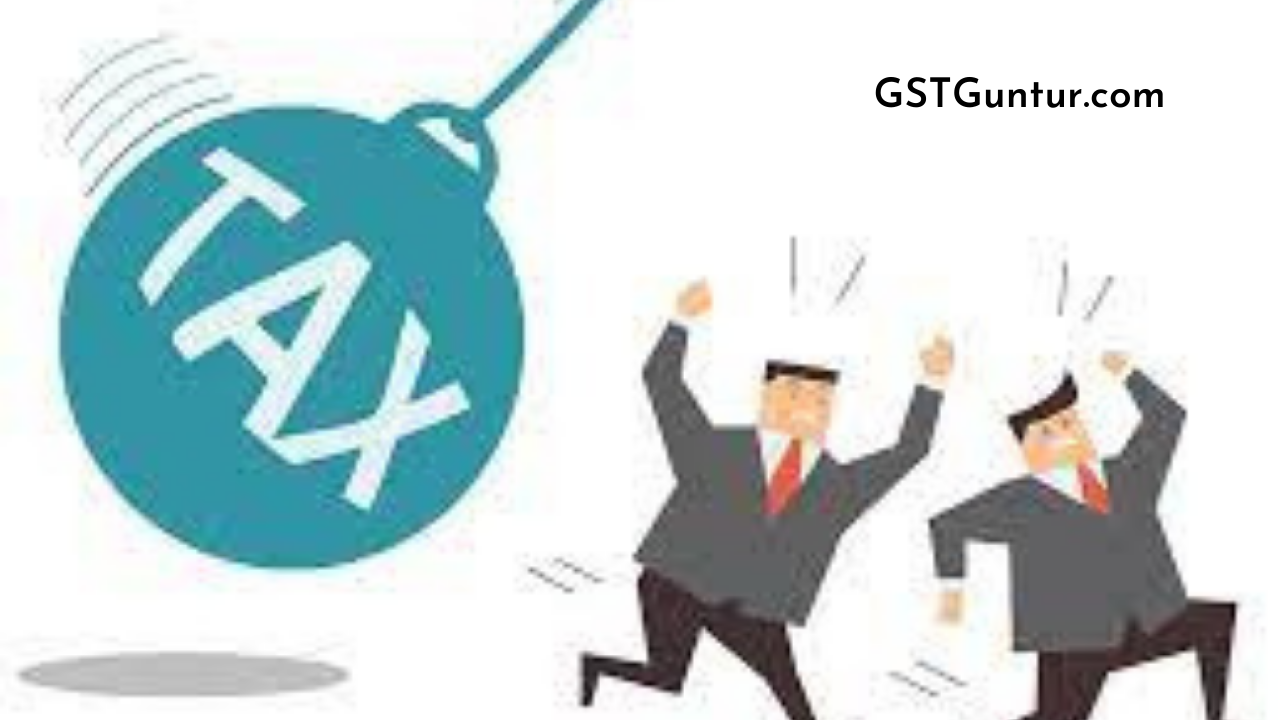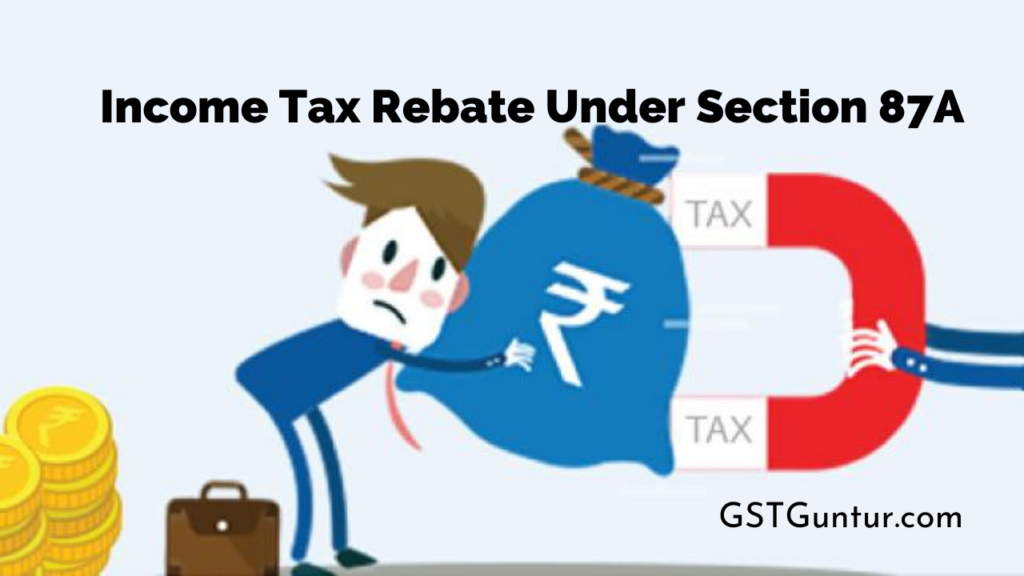Income Tax Rebate Under Section 87A: According to the Intermin Union Budget of 2019-20, as presented on 1 Feb 2019, the finance minister has decided that in case of an individual resident of India who has a total income below 5 lakh rupees is entitled to a rebate of Rs 12,500 for the financial year 2019-20. For the financial year 2018-19, the Rebate is Rs 2,500 with a taxable income of 3.5 lakhs. The previous tax rates will be exercised for individuals who earn more than Rs 5 lakh every year. A person can only claim the Rebate under section 87A only when one files the ITR. This article explains the Income Tax rebate under section 87A in detail. There is other information on 87A, how much income tax rebate can one claim under section 87A, and how Income Tax Rebate under section 87A is calculated with examples of when to Claim Income Tax rebate under Section 87A differences between Exemption, Rebate and Deduction.
Synopsis of the Rebate Under Section 87A
For the convenience of the individual taxpayers to lower the tax outflow from their pocket, a new section 87A was introduced. Section 87A provides an income tax rebate of Rs 2,000 for individual resident taxpayers not having more than 5 lakh. The various characteristics of Income Tax Rebate under the Section 87A are discussed as follows:
- The tax amount rebate under the new section 87A limited to a maximum amount for 2018-19 is Rs 2500. If the calculated tax payable is less than Rs 2,500, the tax rebate shall be limited to that lower amount. The Government has increased the Income Tax Rebate from Rs. 2500 to Rs. 12,500 in Budget year 2019-20 and is applicable from the Financial Year 2019-20 itself.
- An individual needs to file Income Tax Rebate to claim the particular Rebate.
- Rebate under Section 87A is available to all categories of Individuals, regardless of sex and age. They are eligible to claim Income Tax Rebate under Section 87A. Other forms of assesses like HUF, Companies, Partnership Firms, LLP etc., though, are not eligible to claim the Income Tax Rebate under this new section.
- Income Tax Rebate under Section 87A is eligible for the Resident Individuals and not for the Non-Resident Individuals.
- Education Cess and SHEC would be charged on the Tax payable only after allowing for Income Tax Rebate.
- Total Income before cess cannot exceed a defined limit, which is 3.5 lakhs for 2018-19 but 5 lakh for 2019-20.
- Super-Senior Citizens, that is, individuals above 80 years of age, cannot enjoy the advantages of this Rebate. Their earned income up to Rs 5 Lakh has been previously excluded from the charge of Income.
Rebate is Unlike Tax Exclusion
- A tax exemption is when the earned Income does not attract Tax. For example, Agricultural Income made by a taxpayer in India is excluded from the tax levy.
- A rebate on Tax is the amount of tax that an individual is exempted from Payment.
- In the interim budget 2019-20 on 1 Feb 2019, the finance minister has announced a rebate and not an exemption. After all the deductions, people whose taxable income is higher than ₹5 lakh will apply the old tax rates. For example, an individual with a taxable Income of ₹10 lakh will have to pay a 5% tax on his taxable Income between ₹2.5 lakh to ₹5 lakh.

Rebate for Financial Year 2019-2020 (AY 2020-21) According To Budget
A person can claim a tax rebate of up to 12,500 if his total income (after deductions) is equal to less than Rupees 5 lakhs if you are a resident Individual, including Senior Citizen. The general conditions to claim a Rebate are:
- A person has to be a resident Individual.
- His Total Income, excluding deductions (under Section 80), must be equal to or below Rs 5 lakhs.
- The maximum amount of Rebate one can claim Rs 12,500. If the total tax payable is below Rs 12,500, then that amount will be the Rebate under section 87A, applicable to the total Tax adding the 4% educational cess.
Rebate for Financial Year 2018-2019 (AY 2019-20) Under The New Section 87A
An individual can claim the tax rebate under this particular provision having fulfilled the following conditions:
- The individual resident condition is still valid here.
- A person’s Total Income, excluding the deductions (under Section 80), must be equal to or below Rupees 3.5 lakhs.
- The rebate amount has been restricted to Rs 2,500. If the total tax payable is less than Rs 2,500, that amount will be the Rebate under section 87A and applicable to the total Tax before adding 4% educational cess.
Who Gets The Benefits of Tax Rebate Under Section 87A?
Benefits or leverage under section 87A is available only to the resident individuals below 80 years of age with a net income up to Rupees 5 lakhs.
The Rebate will be available under the following eligibility criterion:
- The person paying the Tax has to be a resident individual who is less than 80 years old.
- The Total Income must be Rs. 5,00,000 or below that.
Advantages of tax rebate do not apply to other assesses like HUF, AOP, BOI, Company, Trust, LLP, Partnership Firms, etc., including individual NRIs.
Since When Has The Rebate Been Conditioned Under Section 87A?
- The maximum Rs 2000 rebate for total Income up to 5 lakhs was introduced from Financial Year 2013-14 onwards.
- The finance minister made an increase in the Income Tax Rebate to Rs. 5000, which was Rs.2000 earlier for total Income up to 5 lakhs in the Financial year 2016-17.
- The Income Tax Rebate was reduced to Rs. 2500 where the total Income is 3.5 lakhs in financial years 2017-18 and 2018-19.
- The Income Tax Rebate was again increased to 12,500 for total Income up to 5 lakhs in 2019-2020 as per Interim budget 2019-20.
What is the Meaning of Total Net Income?
Total Net Income is defined as the taxable Income excluding any tax deductions under 80C to 80U. For example, an individual’s income is Rs. 5,70,000 and with a total saving of Rs 1,00,000 under section 80C. The total net income, in this case, will be Rs. 4,70,000, which allows the individual to claim a tax rebate under section 87A.
How Much Amount Of Income Tax Rebate Can A Person Claim Under The New Section 87A?
The tax rebate amount is restricted to the total Tax payable with a maximum of Rs 2,000. Suppose the total Tax payable comes to Rs 1,600, then the Government would limit the tax rebate to Rs 1,600 with no tax refund of the unused amount.
If I Claim Less Than The Maximum Limit Under Section 87A, Will I Get A Refund?
No, there will be no tax refunds for the unclaimed Rebate amount.
How to Calculate the Income Tax Rebate Under Section 87A?
To compute the Rebate, the tax rebate is to be deducted from the total payable tax. To calculate this, an individual is required to:
- Add up all incomes, including his salary, house income, gains from the capital, revenues from business, profession or other sources.
- After that, the eligible amount is to be deducted under 80C to 80U and under section 24(b) (Home Loan Interest) to get the net taxable income.
How Can One Claim A Rebate Under Section 87A?
An individual can claim the Rebate under section 87A while filing the Income Tax Return (ITR). The Rebate under section 87Ais the deduction from the Tax payable. This Rebate would be the amount of Tax payable itself or Rs, 2000, whichever is less. This Rebate shall be claimed while filing the return before adding the Education Cess, Secondary & Higher Education Cess. Using the E-filing Excel Utility or Java Utility, this Rebate is calculated automatically.
Is the Rebate Under Section 87A Available In Case Of An Overdue Return, i.e. After The Due Date Has Gone?
Yes, you can claim a rebate under section 87A while filing ITR also. Rebate has nothing to do with a time limit.
Can I Claim A Rebate If The Total Income is above Rupees 5 lakh?
If your total income is above Rupees 5,00,00, and by claiming deductions under various sections, a Rebate of Rs 2,000 can be claimed as the section deals with actual revenue and not the gross income.
Can a Senior Citizen Also Claim A Rebate Under Section 87A?
A rebate on Tax under section 87A is also available to a senior citizen considering his total Income is below Rs. 5 lakhs. Regardless of gender, a senior citizen is not needed not to pay any tax if the total income is up to Rs. 2,70,000. This is only eligible for senior citizens whose age is less than 80 years because the Income up to Rs. 5 lakhs has already been exempted.
What is the Fundamental Dissimilarity between Exemption, Rebate and Deduction?
An exemption means your Income is taxable, but under some Income Tax section, you can claim a portion of it as the exemption is not subjected to Tax. Again, Income Tax Exemptions allowed being declared under head Capital Gains under Section 54, 54EC, 54F, etc. So Income Tax Exemptions are allowed to be claimed only from a specific source of income and not from the Total Income. Unless claims for it, the whole amount would be taxable. Deductions are eligible to be claimed if the taxpayer has incurred some specified expenditure or made specified investments. The best example of Income Tax deduction in section 80C, where an individual can claim a deduction for his investment in LIC, PPF, ELSS, etc. To get this deduction, he must make investments in section 80C regardless of the type of Income, whether salary income or Income from business and profession. The difference between exemption and deduction is that, while exemptions are deducted from their respective mentioned sources as discussed in the Income Tax Act 1961, deductions are subtracted from Gross Taxable Income after adding up all taxable incomes.
Examples of Income-tax Deductions
Few examples of Income-tax deductions allowed are as follows:
- Deduction under Section 80C
- Deduction under Section 80TTA for Interest on Savings Account
- Deduction under Section 80D for Payment of
- Medical Insurance Premium
- Deduction under Section 80E for repayment of Interest on Education Loan
- Deduction under Section 80G for Donations
- Deduction under section 24 section for house property
A rebate is to be claimed from the total payable tax.
Exemptions from Income Tax and Income Tax Deductions are appropriated from the Income, whereas Rebate is claimed from the Tax payable.
